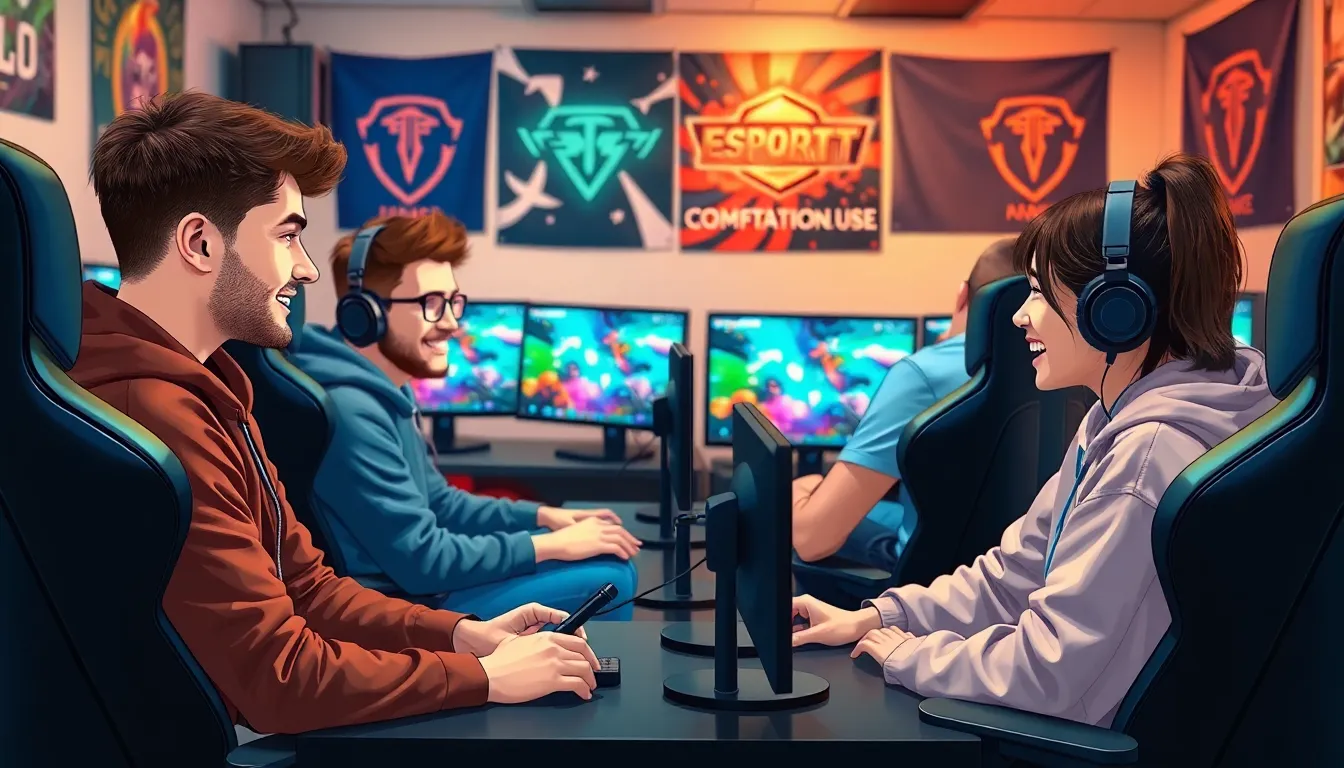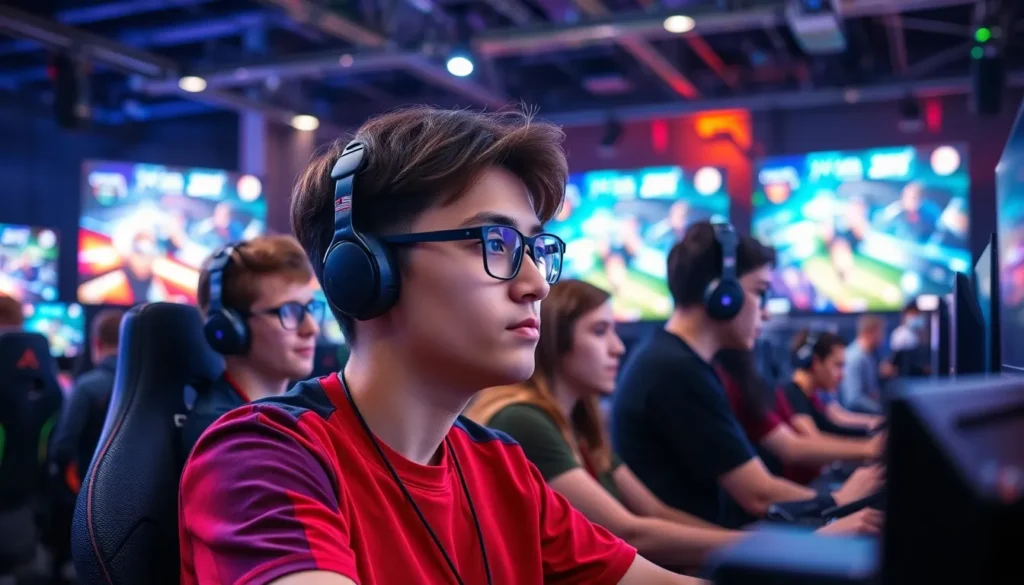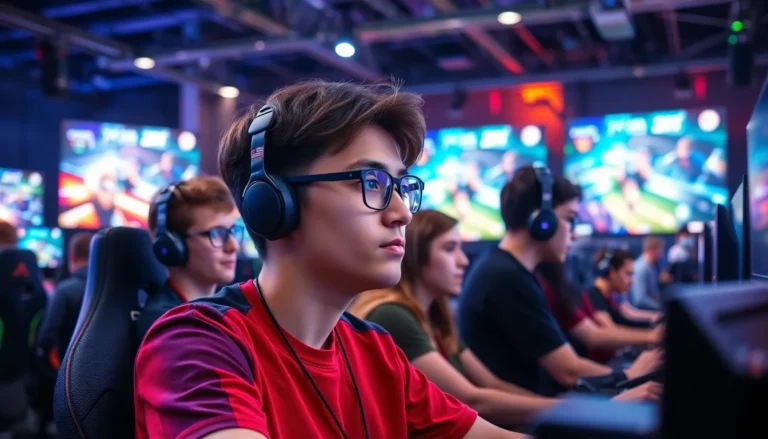Table of Contents
ToggleIn a world where gaming has evolved from basement marathons to global spectacles, esports clubs are the new playgrounds for competitive enthusiasts. Imagine a space where strategy meets camaraderie, and every match is a chance to unleash your inner champion. Whether you’re a seasoned pro or just looking to level up your skills, these clubs offer a vibrant community that’s as passionate about gaming as a cat is about knocking things off tables.
What Is an Esports Club?
An esports club serves as a community for gamers who share a passion for competitive play. Members participate in various gaming titles, spanning genres like first-person shooters, strategy games, and multiplayer online battle arenas. These clubs provide a structured environment for players to train, develop skills, and engage in teamwork.
Competitive gaming thrives within these clubs, where strategy and communication play pivotal roles in success. Players join to learn from each other and to participate in tournaments that showcase their abilities. Clubs often organize events, providing opportunities for members to face off against other skilled teams.
Esports clubs cater to a wide range of skill levels, from beginners seeking guidance to seasoned professionals honing their craft. Coaching resources available within these clubs enhance player performance, often leading to improved rankings and recognition in the esports community. Networking opportunities arise, connecting members with industry professionals and potential sponsorships.
Community engagement remains a cornerstone of these clubs, fostering friendships and a sense of belonging among players. Social events and gaming nights further strengthen ties between members. The atmosphere is typically lively and welcoming, where everyone, regardless of experience, can contribute.
Nurturing talent is a priority for many esports clubs. They often conduct workshops and training sessions, focusing on gameplay mechanics, strategies, and mental fortitude. Members not only improve their individual skills but also learn the importance of cooperation in team-based gameplay.
Benefits of Joining an Esports Club

Joining an esports club provides multiple advantages, enhancing both the gaming experience and personal growth. Members find themselves immersed in a supportive environment that fosters various benefits.
Social Connections
Members develop friendships through shared gaming interests and experiences. Communication occurs frequently during team games, leading to deeper relationships. Social events organized by the club create opportunities for members to bond over their passion for gaming. Networking plays a significant role as members connect with others in the community, which can lead to collaborations in tournaments. Participating in an esports club allows for interactions with individuals from diverse backgrounds, enriching the overall gaming experience.
Skill Development
Skill enhancement is a primary feature of esports clubs, offering training sessions led by experienced coaches. Members benefit from teamwork-focused practices that improve individual performance within a collaborative framework. Workshops delve into gameplay mechanics and advanced strategies, providing crucial insights for all skill levels. Coaches guide players in analyzing their gameplay, facilitating targeted improvements. Regular participation in club tournaments also sharpens competitive skills, preparing members for larger esports events. Members gain confidence while developing critical thinking and adaptability in dynamic gaming environments.
How to Start an Esports Club
Starting an esports club involves several key steps. These steps ensure a structured and engaging environment for members.
Finding Members
Identify potential members by promoting the club through local gaming communities. Utilize social media to reach out to gamers who share similar interests. Hosting introductory events can attract interested players. Encourage current members to invite their friends for increased participation. Utilize campus announcements or community boards for exposure. Collaborating with local game stores can also increase visibility. Forming an online presence through a website or forum creates a welcoming atmosphere for newcomers.
Securing Resources
Secure essential resources by creating a detailed plan outlining needed supplies. Provide a list of games and equipment that the club will utilize. Approach local sponsors or gaming retailers for possible partnerships and support. Consider obtaining a meeting space to enhance organizational structure. Utilizing community centers or schools can provide accessible venues. Invest in equipment and software that facilitate training and tournaments, showcasing commitment. Research grants or fundraising opportunities to help with expenses and encourage community involvement.
Popular Games in Esports Clubs
Esports clubs engage a variety of games that cater to different skill levels and interests. Members often focus on an array of competitive and casual titles, showcasing the diversity within the gaming community.
Competitive Titles
Competitive gaming thrives on titles that emphasize skill and strategy. Games like League of Legends and Counter-Strike: Global Offensive attract players aiming for high-stakes tournaments. Dota 2 provides intense competition, featuring team-oriented gameplay that demands collaboration and communication. Overwatch stands out with its fast-paced action and team dynamics, appealing to those who enjoy strategic shooter games. Valorant continues to gain popularity due to its unique blend of gunplay and character abilities, fostering diverse gameplay approaches. Engaging in these titles allows players to develop critical thinking, teamwork, and individual skills vital for success in competitive environments.
Casual Games
Casual games serve as an excellent entry point for newcomers in esports clubs. Titles like Rocket League blend simplicity with depth, making them accessible while requiring skill development. Minecraft invites creativity and collaboration, promoting social interactions among players. Among Us stands out for its engaging multiplayer experience where strategy and deception play key roles, making it popular for social gaming nights. Fortnite captivates audiences with its vibrant graphics and building mechanics, blending entertainment and competition seamlessly. Integrating these games within esports clubs fosters an inclusive community where players can enjoy gaming while building friendships and improving at their pace.
Esports clubs are more than just places to play games; they’re vibrant communities that foster growth and connection among gamers. By providing structured environments for competition and collaboration, these clubs enhance skills while nurturing friendships. Members not only improve their gameplay but also experience the joy of shared passions and camaraderie.
With a diverse range of games and activities, esports clubs cater to everyone from casual players to serious competitors. They create opportunities for networking and personal development, making the gaming experience richer and more fulfilling. Joining an esports club is a step toward becoming part of a dynamic community that celebrates the spirit of gaming.







